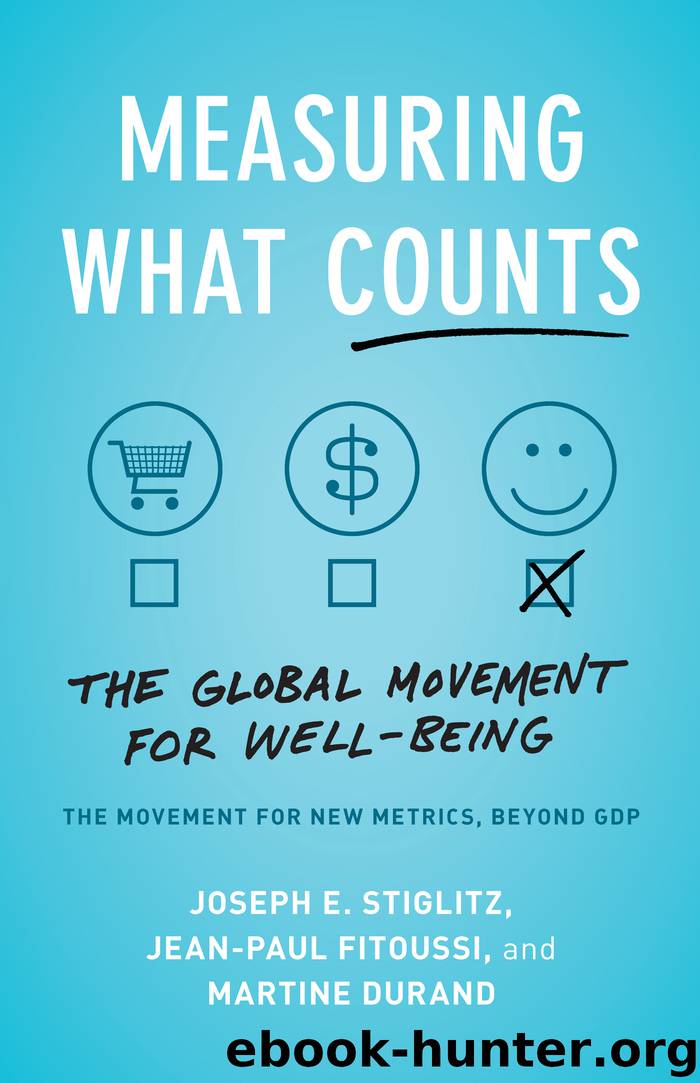Measuring What Counts by Joseph E. Stiglitz

Author:Joseph E. Stiglitz
Language: eng
Format: epub
Publisher: The New Press
Published: 2019-03-07T16:00:00+00:00
Note: Based on the following panel data collections: ECHP, EU-SILC, CPS, CNEF (BHPS, SOEP, HILDA, KLIPS, SHP, SLID). For each country, the period covered is indicated on the horizontal axis. Arc-changes, unlike percentage changes, treat gains and losses symmetrically (e.g., an income gain from USD 50 to USD 100 implies a 100% change but a 67% arc-change; while an income loss from USD 100 to USD 50 implies a 50% change but a 67% arc-change); they are bound between +2 and −2.
Source: Hacker, J. (2018), “Economic security,” in Stiglitz, J.E., J.-P. Fitoussi, and M. Durand (eds.) (2018), For Good Measure: Advancing Research on Well-Being Metrics Beyond GDP, OECD Publishing, Paris. StatLink, http://dx.doi.org/10.1787/888933842147.
Further Research
Further work is required to select the best type of measure, to understand its properties, and to relate insecurity to other aspects of economic performance and individual well-being. The low availability of reliable and cross-nationally comparable data has been a crucial constraint on the development of improved measures of economic security. Three shortcomings of existing statistics stand out: the limited pool of long-term and cross-nationally comparable panel data about the income of various individuals; the weaknesses of most administrative data for tracing individuals over time; and the lack of regular questions about economic insecurity in conventional household surveys.
Measures of complex phenomena are necessarily imperfect, as is the measure of GDP, but that should not prevent us from going ahead. As Hacker observes, the implication of the remarkable advances in the measurement of economic insecurity is that governments should no longer ignore the effects of changes in economic structure and policy on economic insecurity. Policies and statistical practice cannot ignore something that is of first order importance for people and communities.
Sustainability
The importance of sustainability has been emphasized by the name of the goals that the world has set for itself for the coming decades: Sustainable Development Goals. GDP growth today that is at the expense of future generations is unacceptable. As we think about what we do today, we must bear in mind our legacy for the future. If we leave the world a worse place to live, then our own prosperity is at the expense of our descendants’. Economists and philosophers refer to this as intergenerational equity. People used to believe that future generations would automatically be better off than the current one, the only question being by how much. This assumption no longer holds.
Assessing sustainability requires determining if the current level of well-being can be maintained for future generations. By its very nature, sustainability involves the future and, as Yogi Berra quipped (paraphrasing Niels Bohr), “It’s tough to make predictions, especially about the future.” Its assessment involves many assumptions and normative choices. If (appropriately measured) wealth is increasing, then presumably society could do in the future whatever it does today, i.e., it can sustain its per capita well-being. But to assure that outcome, we need a comprehensive measure of wealth, and we need to use the right valuations. The Commission report in 2009 argued that measures of
Download
This site does not store any files on its server. We only index and link to content provided by other sites. Please contact the content providers to delete copyright contents if any and email us, we'll remove relevant links or contents immediately.
The Secret History by Donna Tartt(16611)
The Social Justice Warrior Handbook by Lisa De Pasquale(11486)
Thirteen Reasons Why by Jay Asher(7783)
This Is How You Lose Her by Junot Diaz(5755)
Weapons of Math Destruction by Cathy O'Neil(5032)
Zero to One by Peter Thiel(4818)
The Myth of the Strong Leader by Archie Brown(4787)
Promise Me, Dad by Joe Biden(4441)
Stone's Rules by Roger Stone(4413)
Beartown by Fredrik Backman(4406)
How Democracies Die by Steven Levitsky & Daniel Ziblatt(4393)
The Fire Next Time by James Baldwin(4338)
100 Deadly Skills by Clint Emerson(4072)
A Higher Loyalty: Truth, Lies, and Leadership by James Comey(4028)
Rise and Kill First by Ronen Bergman(4009)
The David Icke Guide to the Global Conspiracy (and how to end it) by David Icke(3876)
The Farm by Tom Rob Smith(3870)
Secrecy World by Jake Bernstein(3774)
The Doomsday Machine by Daniel Ellsberg(3726)
